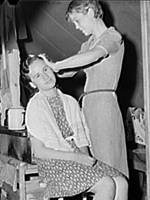
Bogle, Clarence McKnight "Bill"AboutPrisoner of war camp on his family property. The POWs ran the feed mill, worked in the feedlot and alfalfa mill, and harvested cotton and alfalfa.
Abstract
Tape 1, Side A
Bill Bogle was twenty-two at the time the war started. He remembers the prisoners' camp on their land near the feedlot. They ran the feed mill. They were brought to the farm in 1942 or 1943. The Bogles had a large two-story house (which is no longer standing) north of the present office. It was used as a barrack. There were approximately fifteen prisoners living in the house. They cooked their own meals. They worked the feed mill, feed lot and alfalfa mill. They contracted for additional prisoners to chop weeds in the cotton fields and to pick cotton. The prisoners who were housed at Bogle Farms were from Rommel's Afrika Corps. Bogle said, "They were the elite of the German army," and were professional people like engineers and architects. Most were college graduates. One POW was older and a railroad engineer. " . . . he was a particularly good gardener and so they let him go to my father's house and run his garden for him." He was in his fifties. The ones who lived in the house "at first they seemed to be very hungry for bread so we brought additional bread for 'em ourselves" but after a few days they got over their craving. The camp supplied their food. The prisoners kept their own records. "In general these German prisoners of war were smarter than the U.S. Army people that were here," says Mr. Bogle. One day they were going to butcher a beef. The army guard said he would shoot the steer. The gun didn't work. The guard took the gun apart and there was no firing pin. After the Germans left Italian POWs were assigned to the farm and they did not want to work. The war was winding down and more people were coming home. Some of the migrant workers rented land they farmed as sharecroppers and they worked German POWs as well. |

